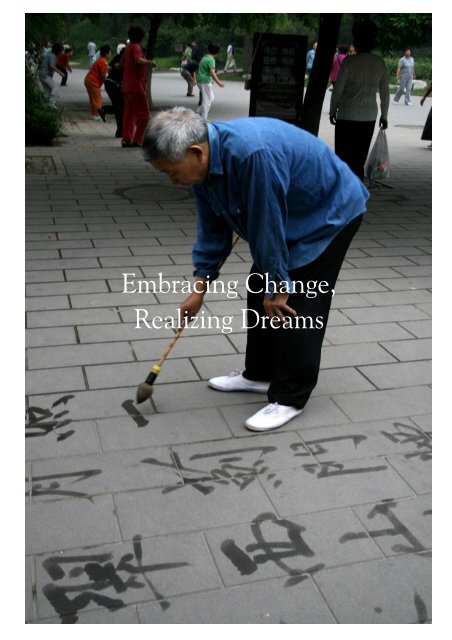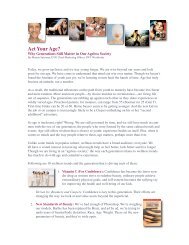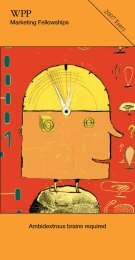Embracing Change, Realizing Dreams - WPP.com
Embracing Change, Realizing Dreams - WPP.com
Embracing Change, Realizing Dreams - WPP.com
Create successful ePaper yourself
Turn your PDF publications into a flip-book with our unique Google optimized e-Paper software.
WHY SENIORS MATTER IN CHINAPre-modern or traditional Chinese society placed elderly people on a pedestal. Theywere valued for their accumulated knowledge, their position within the extendedfamily, and the sense of history and identity which they helped the family to develop.Respect for elderly people was an integral part of Confucian doctrine, especially forthe family patriarch.That position has not changed much. China’s future is charted, and kept on course bythe Politburo, a core group of powerful party leaders. Seven out of nine members of thePolitburo are above 63. Even retired members of the Politburo and the ChineseCommunist Party (CCP) retain great power by serving as members of shadow advisorybodies. The CCP itself has a tradition of elderly active within its power structures, andits great leaders, Mao Zedong, Zhou Enlai and Deng Xiaoping, worked to a very greatage, into their eighties. Citizens refer to the more approachable of the Chinese leaders,Prime Minister Wen Jiabao, as Grandpa Wen, a sobriquet he lived up to when hepersonally supervised the rescue efforts during the Sichuan earthquake (shown in theabove picture).The bulk of China’s industrial landscape continues to be led and shaped by those at thehelm of state-owned enterprises. Path-breaking entrepreneurs such as Haier’s ZhangRuiming and Lenovo’s Liu Chuanzhi are above 55 and continue to play powerful roles intheir organizations, indeed, their industry. In the private sector, even as the secondgeneration gradually takes charge, the founders of the <strong>com</strong>panies remain influential,
using their contacts, influence and power to swing decisions. These are the people whohave, in the era of Opening Up, have shaped China. And they haven’t been forgotten.This group also believes in looking after their ilk. It was once part of the filial dutiesimposed by Confucianism to care for one’s parents when they were old, so that whenyou too were old your children would in turn care for you. In the new China, that oldorder and sense of duty is breaking down, and the increased migration to cities ofyounger people, leaves the elderly as a residual population in smaller towns andvillages, and dislocating, literally and figuratively, the traditional links betweengenerations. So the elder leaders stepped in. In 2006, when the 11 th Five Year Plan forthe aged population was passed, it promised to establish 10000 senior citizensuniversities and schools, add 800000 nursing home beds, and open parks, museums, andlibraries that would provide free or discounted services to senior citizens. In addition,private and foreign capital was invited to serve senior citizens, not only in the fields ofmedicine and finance, but also entertainment, tourism and legal services. The leadersknow that at 65, it was quite possible that you’d want to splurge a bit of your lifetime’ssavings on a beach holiday, as it was that one of your kids would like to wangle his or herinheritance out of you sooner.That opportunity is being wholeheartedly embraced by China’s seniors. Go to a park inany city in the morning, and you will find it full of energetic elders engaged in activitiesas diverse as playing paddleball and pingpong, flying kites and crocheting mobile phoneholders, singing an operatic piece or playing the erhu. On the grounds of the Temple ofHeaven in Beijing, we must have counted at least twenty-five such activities.
As these pictures show, theirs is not a gray world. It is a world that is filled with color andlife.Some of this color also <strong>com</strong>es from the fact that it is they who look after China’s littleemperors and empresses. With the parents off to work, the responsibility of minding thetoddler falls on the grandparents. While many societies may <strong>com</strong>plain of a generationgap, there’s a bridge being built between generations in China. But this change is asconfusing for the elder as it is for the child. The transition from being a dotinggrandparent to be<strong>com</strong>ing the disciplinarians and main caregivers is challenging. Sincethe child’s parents are still in the picture, chaos can sometimes ensue in therelationship – it’s difficult when the parents <strong>com</strong>e in on occasion and try to disciplinethe kids on a part-time basis.The overall associations with old age and retirement are positive. Although the legalretirement age in China is 60 for men and 55 for most women, many employees ofstate-owned enterprises have been allowed to retire in their late 40s or early 50s tomake openings for new graduates and others. That leaves a lot of active years left inthese people: life expectancy currently runs at 71.8 years. In a study by the insurance<strong>com</strong>pany AXA 3 , 66% of retired people surveyed had positive associations, such as afeeling of having more time to devote to oneself, freedom, being able to enjoy life, beingable to do things they liked, traveling, indulging in sports and leisure activity and havingtime for others – including taking care of their grandchildren. Those who were workinghad an even more positive outlook; with 76% believing that life after retirement wouldbe good.Half that number of retired people was pessimistic, citing poor health, financialdifficulties and loneliness as associations with life as a senior citizen. If significantmajority of a demographic segment are feeling good about themselves, why should wefeel sorry for them?This is the unlabelled generation that shaped contemporary China, and we have aresponsibility to give them the opportunity and the means to make the most of theirremaining lives.
Senior citizens have as much time on their hands, as arethey eager to give their opinion about every subjectunder the sun.
STUDYING SENIORS – WHAT A PLEASURE !As research subjects, seniors are a pleasure to work with. They are garrulous; they areas open as they are opinionated. They aren’t usually rushing off for meetings, eventhough they might sometimes have to collect their grandkids from school – when they’rehappy to take you along. They are eager that you meet their circle of friends, mahjong ortaichi partners.Our study spanned China’s megalopolises – Shanghai and Beijing, a relatively big city,Chengdu, and a small town in Guangdong province, Foshan. Using a mix of video andphoto ethnography, and quantitative methods, we spent time with them, as much as wemeasured their opinions and preferences. We didn’t bundle them into conferencerooms. Rather, we had conversations with them in their natural habitat: parks,teahouses, their homes (or those of their children), old age homes, public libraries. Thatexperience itself was heartwarming.Our exploration spanned a range of subjects:- how satisfied or dissatisfied they were with what life had to offer them- to understand their views about changes they’d witnessed in Chinese society- to get a deeper appreciation of their relationships with their family: their childrenand grandchildren; the challenges faced in and expectations from thoserelationships- to understand which channels they sought and received information and news from- to understand the relevance of various products and services for them, as well as geta sense of their unmet needs- their attitude towards retirement homes.That apart, we also were keen on exploring the representation of senior citizens in themedia, particularly marketing <strong>com</strong>munications; since we believed that much of the time,they were depicted as the ones who stood in the way of progress and modernization, as iftheir negative or outdated opinions had to be over<strong>com</strong>e in order to get ahead.For those interested in the numbers, our quantitative sample <strong>com</strong>prised 1100 men andwomen in equal proportions, with a minimum of middle school education, anddistributed across high, middle and low in<strong>com</strong>e groups. Our video ethnography sample<strong>com</strong>prised four individuals each in Beijing, Chengdu and Foshan. The views of anentire range of seniors - those living with their children and their families, old couples,living alone and those living in senior citizens homes are represented in our analysis.This monograph is ac<strong>com</strong>panied by a DVD containing a documentary. We urge you tospend the 52 minutes that would be required to view it.
<strong>Embracing</strong> and Adapting to<strong>Change</strong>
Sixty-eight year old Wu Yi is affectionately called hiphop granny by her friends, andnow by the Chinese and international media. “I had the idea of setting up a hiphopdancing team in 2003, when I happened to watch a national hiphop dancing<strong>com</strong>petition on TV. At that time, I thought, why not establish a hip hop dancing teamof old people?” she said, her eyes twinkling. Wu Yi infected four of her friends with herenthusiasm. The old women donned red T-shirts and camouflage trousers, wore theirsports shoes and colorful headbands and got going in a park. It was only a matter oftime before sixty women joined the dancing team. Initially, some of their friends andrelatives thought they were crazy and disapproved; now they’re stars on TV showsthemselves and have started off a movement in several cities.“Don’t get in the way of change.”Over their lifetime, China’s seniors have seen their vast nation being lifted out ofpoverty and transformed into a glittering example of economic progress. In the cities,they have seen average per capita in<strong>com</strong>es rise nearly thirty times since 1978, the yeareconomic reforms were introduced. The per capita spending power of senior citizens isexpected to rise from $1620 in 2005 to $4112 in 2015 4 . These people have lived throughand participated in that incredible transformation.They have shed beliefs that they’d had been indoctrinated with in their youth. They’vegone from having to stand in queue for food and kerosene rations to having the mostincredible choice of local, national and international brands on the shelves of their localsupermarket.But within that change, they have held on to their family values and traditions. Amajority of seniors – 51% lived with their children, and this number increased to 61%when we went to a smaller town like Foshan. Certainly finding more living space is not aproblem in a smaller town, but the seniors or their families aren’t looking for it. 40% ofthe seniors were empty-nesters, living with their spouse, and 8% lived alone. However,what was <strong>com</strong>mon among the empty-nesters is that they chose to live in close proximityto their child’s home.What is paramount in the family is the need to maintain a harmonious relationship, andthat translates into financial, emotional and care interdependence. Intergenerationalsolidarity is very strong, across the city tiers. 91% of the seniors believed that livingtogether, or regular visits were a way by which the young supported their parents; 73%considered material means (other than financial) as a way of support, while 63% hadfinancial expectations of support. In smaller towns such as Foshan, grandparents feelmore obligated to help with childcare, because they are more dependent on theirchildren for old age support.The key here is interdependence, and both sides making physical and emotionaladjustments. Seniors describe the younger generation as one that is more open-minded,
independent, westernized, fashionable andimpulsive, and they accept the change.Overall, 57% of our respondents felt thatwestern culture had a positive impact, allowingChina and its residents to internationalize,learn from advanced technology, and enabledan upgrade in living standards. Among the 43%who felt the negative impact, the mainconcerns were about society be<strong>com</strong>ing ‘tooopen’, and the young forgetting Chinesetraditions. The ‘worship of all things foreign’,without a proper evaluation of if it is really goodfor them, is a cause for worry too. In the pastdecade, instances of living together beforemarriage are much more <strong>com</strong>mon among theyoung, and their parents accept it as the falloutof westernization. They do draw the line,however – having a baby before getting marriedstill remains a taboo. Some, like ZhaoZhonghua in Beijing, believe that “youngpeople frequenting karaoke bars, girls wearingminiskirts and sex before marriage all representa certain stage of social development, and this isunstoppable.”On their part, young people know that theymust keep their parents on their side. They’rethe ones who will pay for the wedding, but moreimportantly, they’re the ones who will look afterthe children when they arrive. Many oldparents dip into their retirement savings to helptheir son or daughter take the first step towardsbuying a home. As these couples settle downinto their jobs and begin earning well, thephilosophy of reciprocity demands that theydemonstrate their gratitude through gifts.Many seniors remain dismissive of suchmaterial returns: “I don’t bother. To me, if myson does well in his job and achieves more thanwhat I have is enough. It is more importantthan gifts or money.”
A significant number of senior citizens have embraced the opportunities that modernChina has thrown up. If the old lady above, with a karaoke microphone, in the <strong>com</strong>monentertainment room in an old age home in Beijing, is any indication, new technologiesmust be embraced with gusto. You only have to look at their spend patterns: after food,daily necessities and paying for utilities, their highest spend is on tele<strong>com</strong>munications –even more than their medical bills. New technology allows them to keep in touch, notonly with their family, but also with their friends. 85% of our respondents said they keptin touch with friends through email; 68% emailed their relatives, and 53% emailed theirchildren. The internet also enables them to have fun; and for the few who have thestomach or the spare cash, to trade in stocks online.Main Spending Categories1 Food2 Daily care3 Public utilities4 Tele<strong>com</strong>munications5 Medical6 Nutritional supplements7 Apparel8 TransportationIn Shanghai, over 200000 seniors hit the webevery day. The ‘Old Kids’ website containsinformation on tai chi and hip hop classes,subway services, investment and legal adviceand an ‘ask the doctor’ service. Through thepersonals column on the site, five couples haveeven got married, well after their respectivespouses passed away. Prime Minister WenJiabao, of course, has his own Facebook page.Senior citizens in Shanghai are now able to take distance learning courses close tohome as almost all local <strong>com</strong>munity centers have been equipped with Web-basedlearning facilities. The Shanghai Education Commission, which runs the seniors
distance learning university had set up 213schools and 4,261 teaching centers in<strong>com</strong>munities throughout the city. Each ofthe <strong>com</strong>munity teaching centers can hold 20to 50 people for TV or <strong>com</strong>puter-basedlearning programs. About 887,000 seniorshave taken the distance learning coursessince university was set up four years ago.Web-based courses range from health care,arts, news, tourism, sports, literature andhistory, as well as foreign language skills.“We’ll continue to offer more interestingcourses to enrich senior citizens’ lives andencourage them to keep learning,” said LiJunxiu, the <strong>com</strong>mission’s director. He wenton to add that the city government wants toraise the percentage of distance learningcourse attendants to 20 percent of the city’s2.6 million citizens above the age of 60.Seniors have also embraced the modernshopping formats of the supermarket, and citethe clean, hygienic environment as ell as thediverse choices and reliability that the formatoffers. This is of course more true forShanghai and Beijing, where 84% and 96% ofour respondents, respectively, shoppedregularly at supermarkets, <strong>com</strong>pared with47% in Foshan and 50% in Chengdu. In thelatter cities, seniors remain accustomed tobuying at wet markets, believing that foodand groceries are fresher and cheaper than atsupermarkets.With traditional care systems breaking down,indeed reversing, and in the absence of asocial security system, seniors find that they must invest in taking care of their health.76% of our respondents said they did some kind of exercise; 39% took dietarysupplements and vitamins, 23% believed it was important to important to remain active.With hospitals overcrowded, they would rather spend time taking preventive measures.While they believe in the efficacy of traditional Chinese medicine in curing andpreventing most <strong>com</strong>mon illnesses, they find the modern modes of delivery, in the formof pills, capsules and suppositories much more convenient than having to grind and boila druid’s (sorry, TCM practitioner’s) magic potion. It is also in the healthcare categorythat seniors tend to be brand conscious. Calcium supplements such as Gaizhong Gai andCaltrate, ‘brain’ tonics such as Naobaijing, and nutritional additives such as Angli
featured among their favourite brands; apart from milk brands like Mengniu, Sanyuan,Guangming and Yili.One area of impending change is in the notion of living in a retirement home. Even though veryfew of the seniors we met lived in one – we had to make the conscious choice of studying theresidents of one, 26% of our respondents said yes to the idea of living in one. 74 year old JinHongyin explained, “My children are very busy with their work; they have their own lifestyles andI enjoy my own. Living together may cause hassles for both of us.” Jin’s husband passed awayseveral years ago and her three sons are all married. Two years ago, Jin rented out her house andmoved to the retirement home. Sitting on a park bench with one of her fellow-residents, she said,“I can chat and play cards with my friends, and sometimes I watch TV programs. Life here isinteresting and colorful.” Jin does not think that her children are not filial, instead she feels proudthat she now lives on her own. She earns 1,000 yuan a month from leasing her former residence,more than enough to pay the monthly fees of 560 yuan. But it wasn’t easy. “When I decided to liveat the retirement home, my sister-in-law cried for me, saying that I’m pitiful and she criticized mysons for letting me go,” she told us.The lesson for us is evident: old people in China have changed faster than our beliefsabout them. There is immense opportunity in the ways they lead their lives currently.Brands, corporations, government agencies can either choose to treat ageing as aproblem, or they can view the optimism and adaptation capacity of this generation as anopportunity. But wait a minute: there are many seniors who have not only adapted, butare also living out a dream.
<strong>Realizing</strong> <strong>Dreams</strong>
In the sprawling grounds of the Jingshan Park, in the north of Beijing’s Forbidden City,62 year old Chen Shuqin, who you see on the previous page, gives his vocal chords aworkout. Until ten years ago, the retired government official never had the opportunity.He was too busy implementing government programs in his district, and his passion formusic remained confined to catching an occasional performance. No longer. He joins agroup of enthusiasts, who call themselves theZiguang Chorus Group, sings songs mainlyfrom the 1950s and 1960s. During eachgathering, ‘The Ode to the Motherland’ isalways the second last song they sing, and it isfollowed by ‘Unforgettable Evening’ when allthe members wave their hands for farewell.The singers are of different levels of<strong>com</strong>petence, and this affects the overall effectof chorus. During each performance, somesemi-experts, all in their sixties, volunteer tobe chorus conductors. Chen Shuqin prefers tostay away from centre-stage. “I enjoy singing,not making others sing,” he says.In another shaded corner of the park, a couple– the man playing the erhu, the lady crooningan operatic piece, give flight to their own fancy.They aren’t looking for appreciation; they’remerely living out a dream of togetherness.They don’t expect applause from bystanders,but if someone does, they acknowledge itgently.After retiring in Shanghai in 1994, JeffreyWong (pictured on the left), becameconcerned about the rapid pace ofdemolition and lack of protection for historicarchitecture in the area. From this concern,Wong cultivated an extensive collection ofthreatened architecture in the area. With hisfirst architectural purchase in 1998 of aQianlong era house from Suzhou, Wongcreated his own formula for historicpreservation. “I took it apart, brick by brick,tile by tile, pillars and all,” recalls Wong. “Then I shipped it over to a piece of land Ihad acquired earlier in the Qingpu district of Shanghai where I had a workshop. Ihired old craftsmen from the Suzhou area and started to repair and rebuild the housethere.” Over the past seven years, Wong has collected over 150 architectural
structures across China, rescuing them fromcertain demolition, including mansions fromthe Ming Dynasty, historical houses, teahouses, pagodas, bridges, and temples likeShanghai’s original Jing An temple. With noplans of starting a new hobby anytime in thenear future, Wong spends his retirementdays reading, studying Chinese history andculture, and practicing his Chinesecalligraphy.But Li Yuze, pictured above right, takes hiscalligraphy very seriously. An array of brusheshangs on the wall of his small living room inBeijing, and sheet after sheet of text liestacked on a table. Every morning, he gets outof his apartment for a walk up Jinsghan Hill. Itis where he meets his old friends, as they sharetheir opinions about what’s happening inChina and in the world over glasses of greentea. After that, it is back to his parchment,brushes and ink. “Retirement give me themental space and time to perfect my strokes,”he tells us. The profusion of stationery andartist material stores near his home, as well asin faraway Chengdu tells us that calligraphy isa vibrant art form that has stood the test oftime, and seniors are the bearers of the flame.Youth-market obsessed folks, why not acalligraphy talent show for seniors on nationaltelevision?Or a group dance / drumming contest, for thatmatter?The enthusiasm of these women, seen on arainy morning on the Bund in Shanghai, ishard to beat. But the pink, clad, stick-wieldinggrandmas aren’t an anomaly. There arehundreds of such groups across cities big andsmall. Every morning, they wake up, pile into abus and arrive at a park, riverside or square,and stage a symphony of sound andmovement. Now and then, a store or a
estaurant or the management of an apartment block invites them to perform at theopening ceremony. They’ve found a way to monetize their passion. Brands could makethem famous and earn their gratitude and <strong>com</strong>mitment!Senior citizens, like those everywhere, are remarkably passionate in preserving thetraditions of China’s past. As contemporary China embraces the spirit of revivalism (asour past explorations into creativity have indicated), their role as carriers of thattradition, ought to be recognized. Will the intricate, fluid swordplay of the group aboveor the pondering associated with a mahjong move be lost in the din and freneticshooting of an X-Box game?Again, like seniors in every part of the developedworld, those in China love to travel. A majorityof them cannot afford to travel far and for long,so they end up frequenting nearby destinations.It is usually when their children gift them aholiday, or take them along on their vacations,that they get to visit some of their dreamdestinations. It doesn’t take much to concludethat there is an enormous opportunity out there,for inland tours by train or bus – to keep costsaffordable.But China is full of surprises. In Qufu,Confucius’s home town, we encountered a groupof fifteen 60 year old men and women who wereon a 500 km cycling trip across Shandongprovince. Kitted out by bicycle <strong>com</strong>pany Trek,wielding backpacks and supremely fit, they’d have put any twenty-five year old, ‘I workout at the gym three times a week’ city dandy to shame. Red Bull, are you reading this?
EMBRACING THE OPPORTUNITY IN THE SENIOR MARKET
If your minds have been, by now, stretched like the limbs of the ladies pictured overleaf,let’s get back to some marketing / demographic nitty-gritties.Statistics show that in China, the population over 60 is increasing at an annual rate of3 percent, while the population over 80 is increasing at an annual rate of 5 percent.This means that each year, China will have 3.8 million more elderly over 60 and500,000 more elderly over 80. The <strong>com</strong>bined annual in<strong>com</strong>e of the elderly populationis between 300 billion and 400 billion renminbi (between 42-57 billion USD). Thisincludes their pension, in<strong>com</strong>e from re-employment and endowment from relativesand friends. Between 2025 and 2050, the potential purchasing power of the elderly isexpected to be as high as 5 trillion renminbi, which will make the market catering toelderly consumers a large part of the future national economy.With the economic case made, how could you possibly connect better with thisdemographic?1. Give up the bias against senior citizensMany, many brands we work on seem to <strong>com</strong>e to us with one of the two problems: myuser profile is aging, or my brand has a dated feel to it. It is always a problem, never anopportunity. The inevitable solution that is sought ‘please help me make my brandyounger’. If there’s a significant proportion of the brand’s current user base that is old,their needs, aspirations and beliefs are glossed over by a simple statement: ‘they’re old,but they feel young at heart’.Pitiful.In marketing <strong>com</strong>munications, seniors are either shown as the ones who representoutdated values, and therefore the need for change and progress must be proven to them;or as the recipient of gifts (usually the brand itself) which their children think is good forthem. These depictions, again, place the seniors at an inferior position.Countless health supplement brands such asGuansheyuan keep on airing TVCs that showold couple smiling in gratitude upon receivingthe gift of a really big pack. Remember whatwe said about seniors not wanting materialreturns from their children, but time? Theunderlying problem with such branding and<strong>com</strong>munications is this: they are based on theneeds of the gifter, who is making up for notspending time with his parents, rather thanthe need of the user. If the same brand
changed its approach to one where the promise was about enhancing the physical ormental agility of the seniors, it would perhaps be much, much more effective.In other <strong>com</strong>munications, we have observed seniors being shown as being disapprovingof, or wondering about the behavior of the young. In our own TVC for M-Zone done afew years ago, two young boys who do a breakdancing routine while polishing a glassdoor straighten up at the approach of an old man. He runs into the door, of course – sois the butt of the whole joke, but our point is: do we have to drive a wedge between thegenerations?2. Create lifetime value at 50It was pretty straightforward to figure out the brand choices of senior citizens throughour quantitative study. We know that their favourite soap brands are Lux and Safeguard,they like using White Cat, Omo and Libai detergents to do their washing, and wash theirhair with Rejoice shampoo. Li Ning is a favorite sportwear brand, popular in both Beijingand Chengdu (possibly the fact that its owner is a man in his 50s and got himself wiredup to light the Olympic torch creates affinity); though Chengdu residents have a fairliking for Nike as well. As a category, technology products with their high-techinesstotally alienate seniors – at a time when these people spend so much on tele<strong>com</strong>?The question to ask is: are these brands doing anything at all to keep their senior buyers?Probably not. The detergent brands would continue to woo young homemakers, thesoap brands would go on using film stars immersed in suds and earning admirers on thered carpet (or in college), and the sports brands would spend fortunes signing up NBAstars.Keeping existing buyers stuck on your brand is not about <strong>com</strong>munications alone. It is asmuch about designing the right products. We all know that seniors have special needs.Fewer features on a mobile phone, for instance. Just enough to make calls, store phonenumbers and send text messages. It might be worth educating them to do voice dialing.They don’t need the other forty features packed in. It confuses them. Fewer megapixelson a digital camera would do just fine. In a wired China, why can’t the idea ofOne-Laptop-Per-Child be translated into One-Laptop-Per-Retiree?Government statistics 5 point out that there are 58 million seniors engaged in regularsports and fitness activities in China. Isn’t that such a huge market? For most of thesefolks, a sports shoe doesn’t have to be a piece of high-technology. Adequate cushioningfor their arthritic knees and ankles would be adequate. To endorse the brand, youwouldn’t need Shaquille O’Neal. A well-known Chinese athlete from the 1970s woulddo.Seniors have to feel you’re thinking of them. Not as has-beens or by-the-ways, but as
important, valuable customers with unique needs. Not as people who need doles,handouts or price-offs all the time. They’ve saved up for their golden years. Let us givethem the privilege of enjoying themselves.3. Ride upon the group behavior of the older generationFor seniors in the west, loneliness is one of the biggest problems they face. Research hasshown that due to role changes caused by retirement, and deliberate attempts to prunetheir social networks to include only people they feel close to, older adults typically donot have as many people in their social circles as younger people do. They feelemotionally lonely, left out and lacking in close <strong>com</strong>panionship. The implication ofloneliness for brands is that i) you reach these people when they’re alone, and ii) theytake decision in isolation and independently – one of the key factors why this agecohort tends to stay with choices already made ten or twenty years ago.This, as we’ve seen, is far from the case in China, where seniors have a far morestimulating social network that their counterparts in the west, and sometimes eventhe younger generations in China. Seniors typically have a set of overlapping socialcircles: from their past workplace, from the neighbourhood they reside in, theimmediate and extended family. Through these networks, they are constantly beingexposed to new ideas. Moreover, because seniors hang out together, in places that wecan map, it is possible to engage them collectively. So, if Amway (one of the brandswhich seniors in China have a liking for) were to promote its Glucosamine caplets, thebest place to do so would be at a park in the late morning, where you would surely findhuddles of seniors clutching their sore knees. Because old people love to talk andshare experiences, motivating satisfied users of a brand could well be integral to aWOM (word-of-mouth) strategy.The propensity of seniors in China togather, discuss and spread the word canwell be used to reach other people whothe seniors are connected with. One ofthe more interesting gatherings ofseniors that takes place in parks acrossChina, especially on Sundays, centresaround matchmaking. Young people, busy with their careers do not always find thetime for romance and finding a mate. That’s where their fifty or sixty somethingparents <strong>com</strong>e in: as they throng these parks, put up posters advertising the qualities oftheir daughters and sons, and arrange for dates between potential partners. It is herethat you also find representatives of banquet halls and wedding photography studioshanding out business cards! There are plenty of other categories that can ride on thisphenomenon, and involve seniors in spreading the word – amongst themselves, and tothe groups they’re affiliated with.
THE SHIFT THAT’S NECESSARYThe average age of employees at our agency is around 27. Many brand and marketingmanagers that we meet are around the same age, especially those who live in thedigital world. Overwhelmed by change, keeping up with it, it is hard for us all to bring inthe senior outliers into mainstream marketing thought and action. Even academicliterature is thin on senior citizens, barring medical science.Through this monograph and the ac<strong>com</strong>panying video, we hope we’ve been able tobring the voices of our seniors into the boardroom. They fervently hope you’re listening.* * *For further information on this, or other projects on China’s consumer culture done byOgilvy Discovery, please contact:Kunal SinhaExecutive Director – DiscoveryOgilvy & Mather Greater China26 th Floor, The Center989 Changle RoadShanghai 200031, PRC.Email: kunal.sinha@ogilvy.<strong>com</strong>Phone: +86 21 2405 1990ENDNOTES1http://english.peopledaily.<strong>com</strong>.cn/200605/13/eng20060513_265381.html2Asian Demographics Limited: Forecast Asia / China, June 2006.3AXA Retirement Scope China Wave 1, January 20074National Bureau of Statistics, 2005.5http://www.chinadaily.<strong>com</strong>.cn/china/2006-12/12/content_756690_3.htm© Ogilvy & Mather Greater China, 2008. All rights reserved.
















